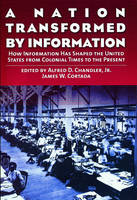
A Nation Transformed by Information
Seiten
2000
Oxford University Press Inc (Verlag)
978-0-19-512701-0 (ISBN)
Oxford University Press Inc (Verlag)
978-0-19-512701-0 (ISBN)
- Titel ist leider vergriffen;
keine Neuauflage - Artikel merken
The editors and contributors in this book argue that information is the driver of a third industrial revolution. They demonstrate that the information revolution actually has been taking place for two centuries, and they trace the history of this revolution from Colonial times to the present day.
This book makes the startling case that North Americans were getting on the "information highway" as early as the 1700s, and have been using it as a critical building block of their social, economic, and political world ever since. By the time of the founding of the United States, there was a postal system and roads for the distribution of mail, copyright laws to protect intellectual property, and newspapers, books, and broadsides to bring information to a populace that was building a nation on the basis of an informed electorate. In the 19th century, Americans developed the telegraph, telephone, and motion pictures, inventions that further expanded the reach of information. In the 20th century they added television, computers, and the Internet, ultimately connecting themselves to a whole world of information. From the beginning North Americans were willing to invest in the infrastucture to make such connectivity possible. This book explores what the deployment of these technologies says about American society. The editors assembled a group of contributors who are experts in their particular fields and worked with them to create a book that is fully integrated and cross-referenced.
This book makes the startling case that North Americans were getting on the "information highway" as early as the 1700s, and have been using it as a critical building block of their social, economic, and political world ever since. By the time of the founding of the United States, there was a postal system and roads for the distribution of mail, copyright laws to protect intellectual property, and newspapers, books, and broadsides to bring information to a populace that was building a nation on the basis of an informed electorate. In the 19th century, Americans developed the telegraph, telephone, and motion pictures, inventions that further expanded the reach of information. In the 20th century they added television, computers, and the Internet, ultimately connecting themselves to a whole world of information. From the beginning North Americans were willing to invest in the infrastucture to make such connectivity possible. This book explores what the deployment of these technologies says about American society. The editors assembled a group of contributors who are experts in their particular fields and worked with them to create a book that is fully integrated and cross-referenced.
Alfred D. Chandler, Jr. is Isidor Straus Professor of Business History, Emeritus, at Harvard Business School. James W. Cortada is an Executive at IBM Global Services.
| Erscheint lt. Verlag | 1.9.2000 |
|---|---|
| Co-Autor | James W. Cortada |
| Zusatzinfo | 36 halftones, 9 line illustrations |
| Verlagsort | New York |
| Sprache | englisch |
| Themenwelt | Geisteswissenschaften ► Geschichte ► Regional- / Ländergeschichte |
| Naturwissenschaften | |
| ISBN-10 | 0-19-512701-3 / 0195127013 |
| ISBN-13 | 978-0-19-512701-0 / 9780195127010 |
| Zustand | Neuware |
| Haben Sie eine Frage zum Produkt? |
Mehr entdecken
aus dem Bereich
aus dem Bereich
Erinnerungen
Buch | Softcover (2024)
Pantheon (Verlag)
CHF 22,40
Universalgelehrter, Polarreisender, Entdecker
Buch | Hardcover (2024)
mareverlag
CHF 39,20


